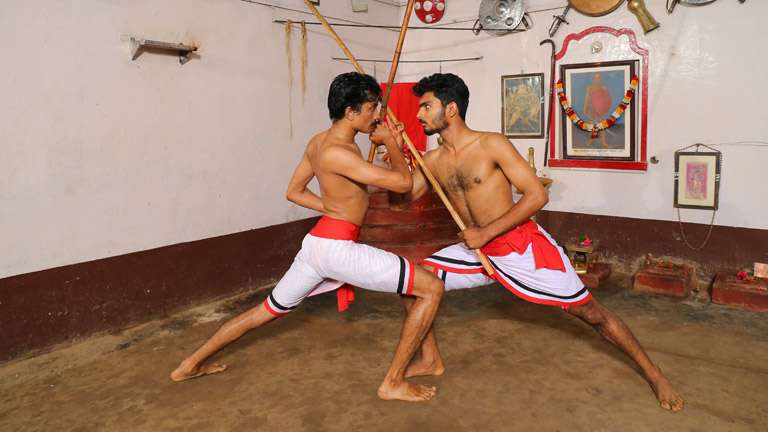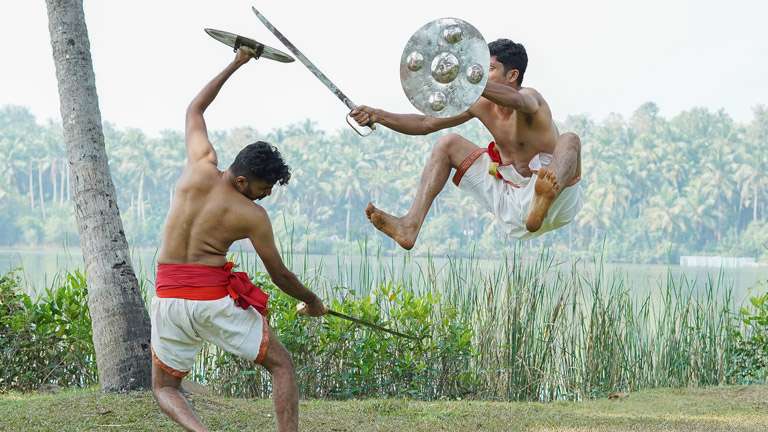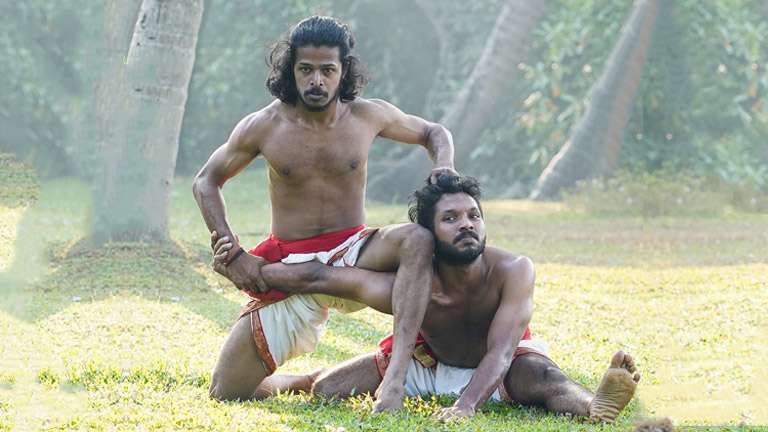


-20022020134802.jpg)
Meythari or Meyppayattu is the backbone of Kalaripayattu, and forms the first step of training. It is a set of physical practices that imparts strength to the body and the mind, and makes the student sure-footed. The practices are categorized under four heads: Kaikuthippayattu or exercises done with the hands (kai) pressed (kuthi) against the floor of the kalari Amarcha or exercises for keeping the body very low, close to the floor Therukkal or exercises to learn advance and retreat moves and Kaaluyarthippayattu or exercises involving lifting the legs (kaal uyarthi) to a vertical position. The student is trained to move and shift his legs in whichever way he pleases – forwards, backwards, sideways and upwards – while ensuring that he does not lose his balance. In other words, he is made to master chuvadu or steps for attack as well as defence. Second and equally important component of Meythozhil that comes in tandem with chuvadu is vadivu or stance. Third is adavu or technique.

Kolthari features the use of various types of sticks – long, short, specially fabricated rounded and curved ones – and the student is taught to use them to attack as well as to defend. After completing the training in Kolthari, the student will be adept at using whatever stick he has in possession to resist all kinds of attacks, make counter-attacks and overpower enemies.

Angathari involves the use of sharp weapons – sword and shield, spear, urumi and dagger – and is recommended only after Meythozhil and Kolthari. Once a student has attained mastery over Meythozil and Kolthari, Angathari is not difficult to learn. Thereby the chances of sustaining serious injuries are considerably reduced too.

Verumkai is extremely important in Kalaripayattu. Literally meaning “bare hands,” Verumkai trains a person to use his own body as a weapon both to defend himself against an armed or unarmed adversary, and to overpower him physically. Thus, for the most obvious reasons, mastery in Verumkai boosts the self-confidence of the individual. Certain palm leaf manuscripts that contain instructions about Verumkai have been known to insist that it should be used only for self-defence and never for attack. Slow moves have no place in Verumkai because they offer no protection. The student is trained to side-step for cover, cross his hands against his chest to protect his vital organs, use his fingers to execute certain specific grasps that will inflict pain on the enemy, break his organs or trip him, use the side of his hand to hit the marmas on the neck and the ribs, use the elbow and the knee to punch the chest or ribs of the attacker, kick with his legs and feet and so on. While the trick is to defend and attack simultaneously, Verumkai also teaches the student how to escape the clutches of the enemy and flee.
Department of Tourism, Government of Kerala, Park View, Thiruvananthapuram, Kerala, India - 695 033
Phone: +91 471 2321132, Fax: +91 471 2322279, E-mail: info@keralatourism.org.
All rights reserved © Kerala Tourism 2025. Copyright | Terms of Use | Cookie Policy | Contact Us. Developed & Maintained by Invis.